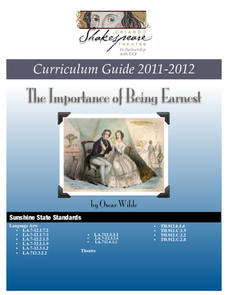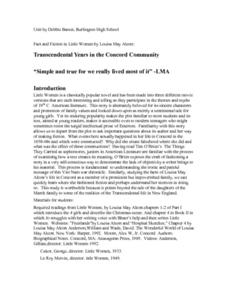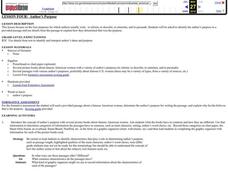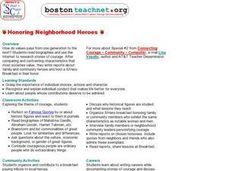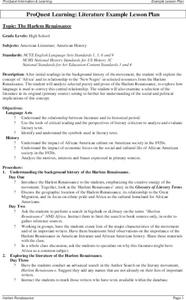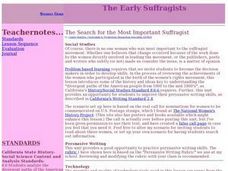Professional Development Institute
Which Is More Important?
Think about the roles of hunters and squaws in Elizabeth George Speare's The Sign of the Beaver. Whose work is more important? Young writers compare Attean and Matt's reaction to each gender's role, as well as arguing their opinion...
Orlando Shakes
The Importance of Being Earnest: Study Guide
Historically, members of the upper class provide plenty of fodder for comedic writers. Oscar Wilde's The Importance of Being Earnest is no exception, and a study guide for the classic play discusses some of the Victorian social issues he...
Curated OER
Virginia Woolf: A Room of One's Own - Shakespeare's Sister
Students, after reading and analyzing, "A Room of One's Own," by Virginia Woolf, analyze how creating and defending one's position as well as how narrative functions as a rhetorical device. They evaluate and focus in on Shakespeare's...
Channel Islands Film
Lone Woman of San Nicolas Island: Lesson Plan 1
As a practice writing test, fourth graders use the West of the West's documentary Lone Woman of San Nicolas Island and two print resources as source materials for an informative article that identifies information that is historically...
Curated OER
Fact and Fiction in Little Women
Young scholars read excerpts from the novel "Little Women." Students work in groups to research, analyze, and answer the questions included in the lesson. After research, young scholars write a paper and include a bibliography. The...
Curated OER
Black History Lesson Plan: Gwendolyn Brooks
Learn more about the work of Gwendolyn Brooks with a language arts lesson. Young learners read an informational passage about the acclaimed poet before attempting a shape poem of their own.
Curated OER
Author's Purpose
Readers identify the author's purpose. First, they read a passage and utilize details from the piece to determine the author's purpose. Then they will explain how they arrived at their conclusion. Links to materials are provided.
Curated OER
Remembering Waiting
After a close study of the pastel drawing Waiting by Edgar Degas have the class imagine the story Degas may be telling through the body language and clothing of the people in the work of art. Your young writers then create a drawing...
Curated OER
Honoring Neighborhood Heroes
Read biographies and use the internet to research stories of courage.Young writers compare and contrast characteristics that societies value. They write reports about their family and community's heroes.
Curated OER
The New Deal: The Works Progress Administration
How did American begin to come out of the Great Depression? Viewers will be intrigued to find one of the answers in this presentation, which details the Works Progress Administration. The slides detail various parts of the WPA with...
Curated OER
Sojourner Truth
Young scholars describe contributions made by Sojourner Truth and identify freedoms they enjoy because of the efforts of people like her. They define suffrage and abolition by experiencing it and by hearing an explanation of the definition.
Crafting Freedom
F.E.W. Harper: Uplifted from the Shadows
What is stereotyping, and how do we handle stereotyping in our daily interactions? Your young historians will not only have the opportunity to learn about the first African American woman to publish a short story–Frances Ellen...
Curated OER
Oliver/Kenyon
Students, through two pieces of writing, identify poetic/language devices through the speakers, personification , imagery, metaphor, etc. They assess the patterns those devices are used in and analyze the theme of each. Each student...
Curated OER
The Harlem Renaissance
Students, after researching/analyzing the movement "Harlem Renaissance" and Africa as well as reading literature from that time period, create lists of the major characteristics of the movement and its important writers. They bridge the...
Curated OER
The Heritage of Puerto Rico and Cuba
Learners examine the influences of the Hispanic culture in the United States. In groups, they read about the life of a slave in Cuba and identify the misconceptions are discussed. As a class, they define racism, read an essay and...
DC Vote
One Kid, One Vote
Learn about why the citizens of Washington, D.C. feel unrepresented in Congress with an article about D.C voting rights. Individuals read about the movement toward congressional representation in Washington, D.C., before answering...
Channel Islands Film
Cache: Lesson Plan 3 - Grades 4-5
Should the excavation of what is believed to be the cave of the Lone Woman of San Nicholas Island be allowed to continue? As a practice exercise designed to prepare pupils for a timed writing exam, individuals read two Los Angeles Times...
National First Ladies' Library
Flopsy, Mopsy, Eleanor, and Beatrix
Young scholars read "The Tale of Peter Rabbit" and view the photos of the pets that inspired Beatrix Potter to write. They then select a different book to read from the University of Pennsylvania's website or from the public library that...
Curated OER
The Early Suffragists
Pupils research early suffragists in an effort to find the most influential leader of the movement. They give presentations and the class chooses a winner. They write letters to the postmaster suggesting they be placed on a stamp.
Curated OER
Female Poets Speak For Themselves
Student examine selected works of twentieth-century female poets that speak to the stereotypes about women inherent in Western culture. Individually, learners explore these stereotypes and their experience with them. Students create a...
Curated OER
Pioneers On and Off the Prairie- Willa Cather and Mary Cassatt
Learners examine the written work of Willa Cather and the impressionist art of Mary Cassatt. They describe parallels in the lives and work of both women and creat a Powerpoint presentation.
Curated OER
The declaration of Independence and Your Rights
Students discuss the Declaration of Independence and the violation of those rights in colonial times. They compare it with the Declaration of
Sentiments and why women felt their rights were being violated. They write their own personal...
Curated OER
Nomadic Life Lesson
Students examine the imagery in a rich, spare poem about an interlude between two women of different cultures in rural Niger. They read "Interview With Susan Rich." and discuss how the interview might help in understanding the poem.
Curated OER
The Declaration of Independence and Your Own Rights
Students read and discuss the Declaration of Independence and the Declaration of Sentiments. They discuss how the rights of the colonists and women were being violated. Students write about their own personal rights and how their rights...



